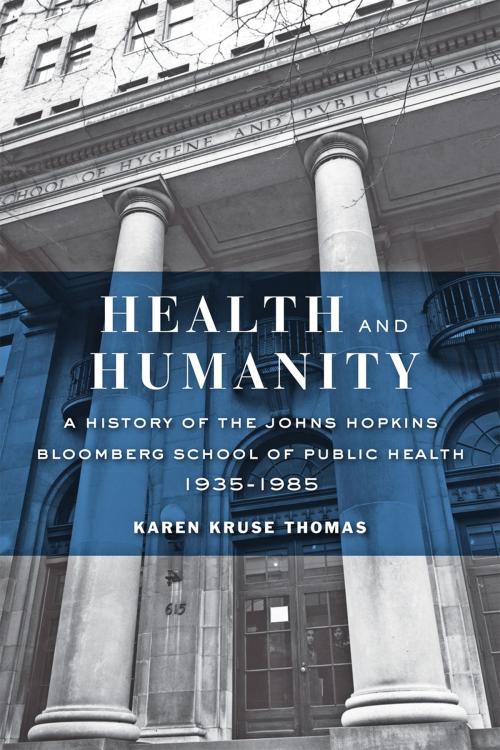Health and Humanity
A History of the Johns Hopkins Bloomberg School of Public Health, 1935–1985
Nonfiction, Health & Well Being, Medical, Reference, History, Public Health| Author: | Karen Kruse Thomas | ISBN: | 9781421421094 |
| Publisher: | Johns Hopkins University Press | Publication: | July 1, 2016 |
| Imprint: | Language: | English |
| Author: | Karen Kruse Thomas |
| ISBN: | 9781421421094 |
| Publisher: | Johns Hopkins University Press |
| Publication: | July 1, 2016 |
| Imprint: | |
| Language: | English |
Between 1935 and 1985, the nascent public health profession developed scientific evidence and practical know-how to prevent death on an unprecedented scale. Thanks to public health workers, life expectancy rose rapidly as generations grew up free from the scourges of smallpox, typhoid, and syphilis. In Health and Humanity, Karen Kruse Thomas offers a thorough account of the growth of academic public health in the United States through the prism of the oldest and largest independent school of public health in the world. Thomas follows the transformation of the Johns Hopkins School of Hygiene and Public Health (JHSPH), now known as the Bloomberg School of Public Health, from a small, private institute devoted to doctoral training and tropical disease research into a leading global educator and innovator in fields from biostatistics to mental health to pathobiology.
A provocative, wide-ranging account of how midcentury public health leveraged federal grants and anti-Communist fears to build the powerful institutional networks behind the health programs of the CDC, WHO, and USAID, the book traces how Johns Hopkins helped public health take center stage during the scientific research boom triggered by World War II. It also examines the influence of politics on JHSPH, the school’s transition to federal grant funding, the globalization of public health in response to hot and cold war influences, and the expansion of the school’s teaching program to encompass social science as well as lab science.
Revealing how faculty members urged foreign policy makers to include saving lives in their strategy of "winning hearts and minds," Thomas argues that the growth of chronic disease and the loss of Rockefeller funds moved the JHSPH toward international research funded by the federal government, creating a situation in which it was sometimes easier for the school to improve the health of populations in India and Turkey than on its own doorstep in East Baltimore. Health and Humanity is a comprehensive account of the ways that JHSPH has influenced the practice, pedagogy, and especially our very understanding of public health on both global and local scales.
Between 1935 and 1985, the nascent public health profession developed scientific evidence and practical know-how to prevent death on an unprecedented scale. Thanks to public health workers, life expectancy rose rapidly as generations grew up free from the scourges of smallpox, typhoid, and syphilis. In Health and Humanity, Karen Kruse Thomas offers a thorough account of the growth of academic public health in the United States through the prism of the oldest and largest independent school of public health in the world. Thomas follows the transformation of the Johns Hopkins School of Hygiene and Public Health (JHSPH), now known as the Bloomberg School of Public Health, from a small, private institute devoted to doctoral training and tropical disease research into a leading global educator and innovator in fields from biostatistics to mental health to pathobiology.
A provocative, wide-ranging account of how midcentury public health leveraged federal grants and anti-Communist fears to build the powerful institutional networks behind the health programs of the CDC, WHO, and USAID, the book traces how Johns Hopkins helped public health take center stage during the scientific research boom triggered by World War II. It also examines the influence of politics on JHSPH, the school’s transition to federal grant funding, the globalization of public health in response to hot and cold war influences, and the expansion of the school’s teaching program to encompass social science as well as lab science.
Revealing how faculty members urged foreign policy makers to include saving lives in their strategy of "winning hearts and minds," Thomas argues that the growth of chronic disease and the loss of Rockefeller funds moved the JHSPH toward international research funded by the federal government, creating a situation in which it was sometimes easier for the school to improve the health of populations in India and Turkey than on its own doorstep in East Baltimore. Health and Humanity is a comprehensive account of the ways that JHSPH has influenced the practice, pedagogy, and especially our very understanding of public health on both global and local scales.















